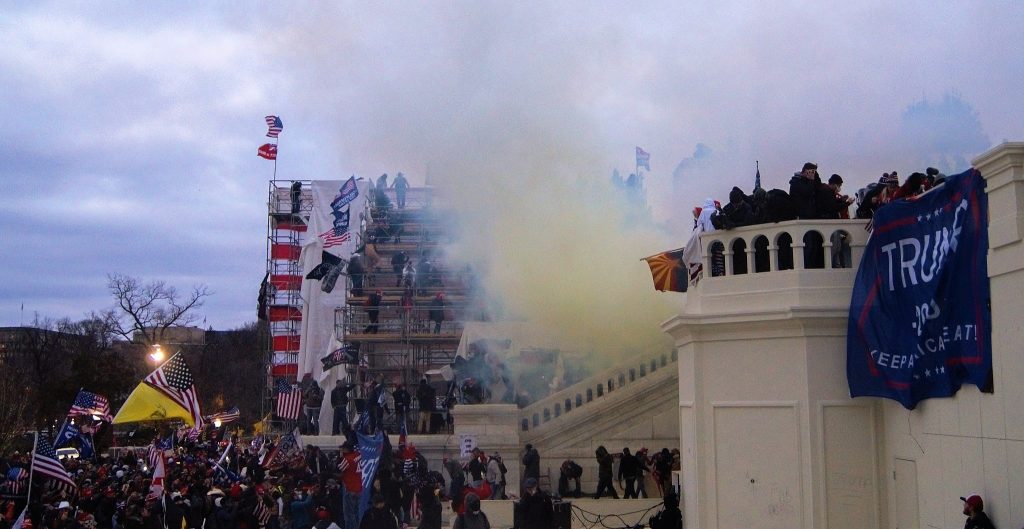
We at the Global Catastrophic Risk Institute were appalled and disgusted to watch as right-wing domestic violent extremists stormed the US Capitol on January 6 to threaten Congress and disrupt certification of the Electoral College vote [1].
Though shocking in its own right, the insurrection fits a broader pattern. Empirical research shows that right-wing domestic violent extremism has been the main source of terrorism in the United States since the attacks of September 11, 2001. We unequivocally oppose all forms of terrorism and political violence. We hope that the tragedy of January 6 will draw attention to the particular threat of right-wing domestic violent extremism and inspire constructive action to address it.
We were appalled not just as citizens but also as experts on global catastrophic risk. The January 6 insurrection appears to have been at least partly inspired by white nationalism that calls for the extermination of nonwhite people, as evidenced by the pro-Holocaust messaging displayed by some of the insurrectionists. The insurrection was also eerily similar to, and likely inspired in part by, The Turner Diaries, an apocalyptic novel in which white nationalists overthrow the US government and use weapons of mass destruction to kill all nonwhites worldwide. Suffice to say, global genocide would be a global catastrophe.
The January 6 insurrection also appears to have been fueled by the same systems of disinformation that undermine efforts to manage global catastrophic risks. The insurrection was motivated by the completely unfounded conspiracy theory that the presidential election was rigged in favor of Joe Biden. Some insurrectionists reportedly also said the COVID-19 pandemic is a hoax. Additionally, some of the same people who spread disinformation about climate change were spreading disinformation about the insurrection. Conspiracy theories like these are in many cases the product of deliberate efforts to discredit scientific expertise and democratic processes. They impede the governance of global catastrophic risk grounded in facts.
GCRI is a nonpartisan organization. We believe that global catastrophic risk can and should be a nonpartisan issue. Concern about global catastrophic risk is consistent with a wide range of political views. If there is one thing we should all be able to agree on, it is preventing the collapse of global human civilization. Although the January 6 insurrectionists came from the political right, the right has also made important contributions to addressing global catastrophic risk. For example, the US Environmental Protection Agency was established under President Nixon; President Reagan’s Executive Order 12291 made cost-benefit analysis a central part of evaluating federal regulations, enabling policy that is more sensitive to high-severity risks. More generally, global catastrophic risk reduction is conservative in the sense that its goal is the conservation of human civilization. GCRI welcomes people of all political views who wish to engage in well-informed, good faith discussion of how best address global catastrophic risk. We do not welcome those who seek to cause harm or cloud the debate.
It is especially important to identify the positive, constructive steps that can be taken to counter violent extremism, misinformation, and threats to democracy. In the wake of the January 6 insurrection, a variety of measures have been proposed, including civics education, public media literacy, deplatforming leading extremists, outreach for de-radicalization, repluralization [2], law enforcement attention to right-wing domestic violent extremism, expunging extremists from law enforcement and the military, tracking cryptocurrency, and democracy reforms on gerrymandering and DC statehood and ranked choice voting. Whether these or other measures should be pursued merits careful attention, and the best measures should be pursued aggressively.
Unfortunately, the political challenges facing the US are not unique. Extremism, misinformation, and anti-democratic movements are global phenomena. Addressing these challenges will benefit from international dialogue and international cooperation. The same holds for many other aspects of global catastrophic risk. For this reason, GCRI builds international partnerships with people and organizations working to address global catastrophic risk. We will continue to work with our colleagues in the US and worldwide to address global catastrophic risk and the political dynamics that increase the risk.
Some might wonder if it could be counterproductive to speak out about these political dynamics since it may upset people in power and thereby reduce the influence of those speaking out. We take this perspective seriously and have at times followed it. However, upon careful investigation, we find that the balance of considerations favors speaking out. Any influence we lose will be more than offset by gains made in reducing the risk of mass extermination and improving the overall governance of global catastrophic risks. As experts in social and political science who focus on the widely unifying theme of global catastrophic risk, we believe we can make valuable contributions to improving political dynamics, and that we should do so.
We recognize the difficulty of the task at hand. The political challenges at hand have deep cultural, political, and technological roots. They will not be resolved quickly or easily. Likewise, addressing them is important not just for the global catastrophic risks that threaten the world today, but also for future threats such as high-stakes forms of artificial intelligence and biotechnology. The January 6 insurrection vividly demonstrates the seriousness of the threat of violent extremism. Let us all learn its lessons and work to build a better future.
Sincerely,
Seth Baum, Executive Director
Robert de Neufville, Director of Communications
Tony Barrett, Director of Research
McKenna Fitzgerald, Project Manager and Research Assistant
[1] Some initial analysis finds that the insurrection may not have been an entirely domestic operation, having potentially received funding from foreign sources.
[2] One theory of radicalization proposes that it is a process of depluralization, in which individuals become fixated on a narrower range of political concepts (for example, the concept of white supremacism), and likewise that de-radicalization can be achieved by repluralization, in which individuals are helped to (re)gain comfort with a wider range of political concepts.
Image credit: Tyler Merber under a CC BY 2.0 license







